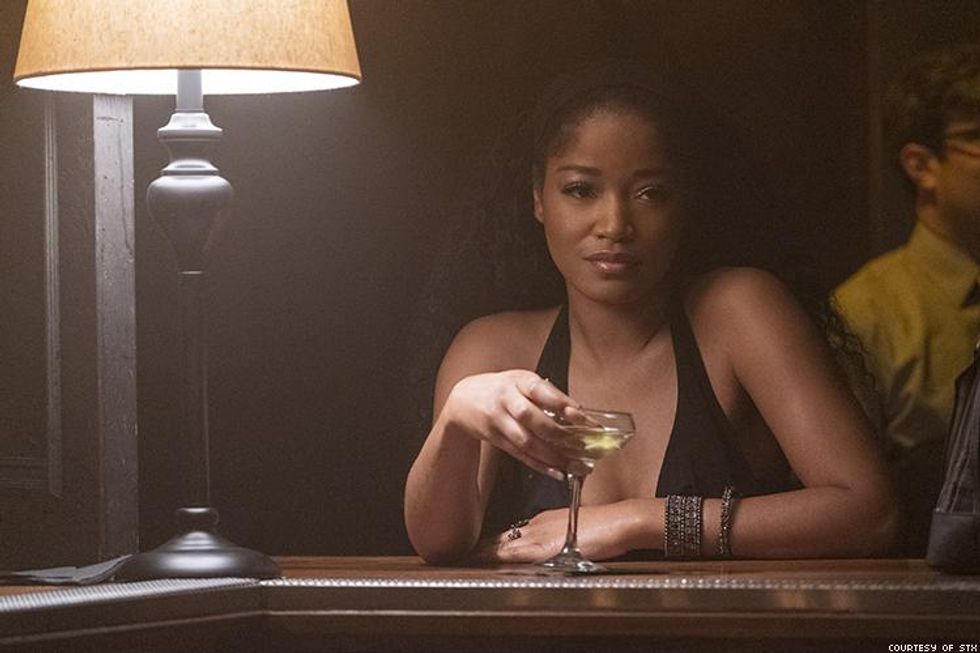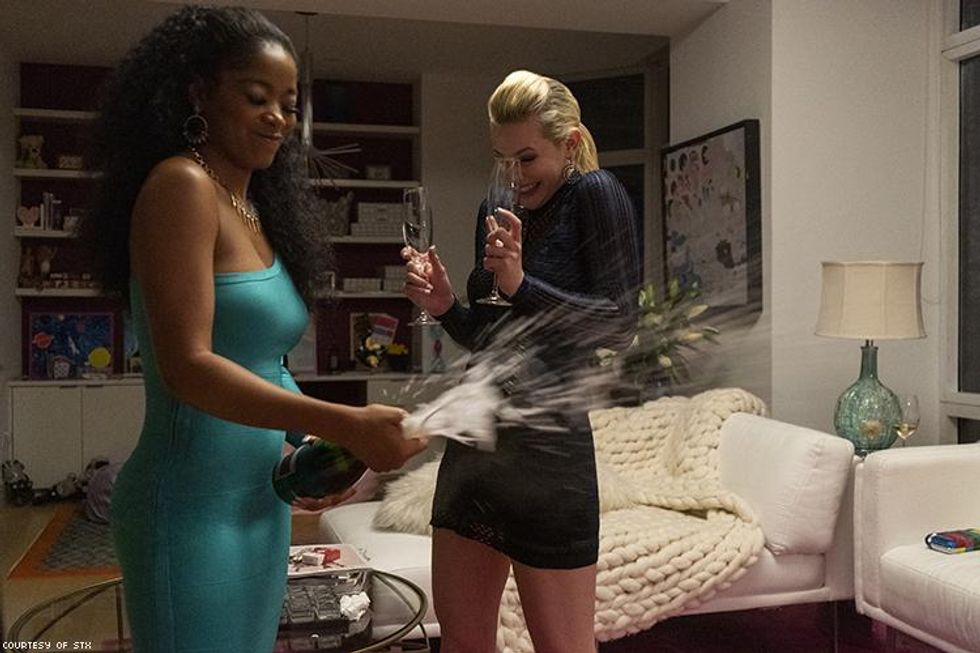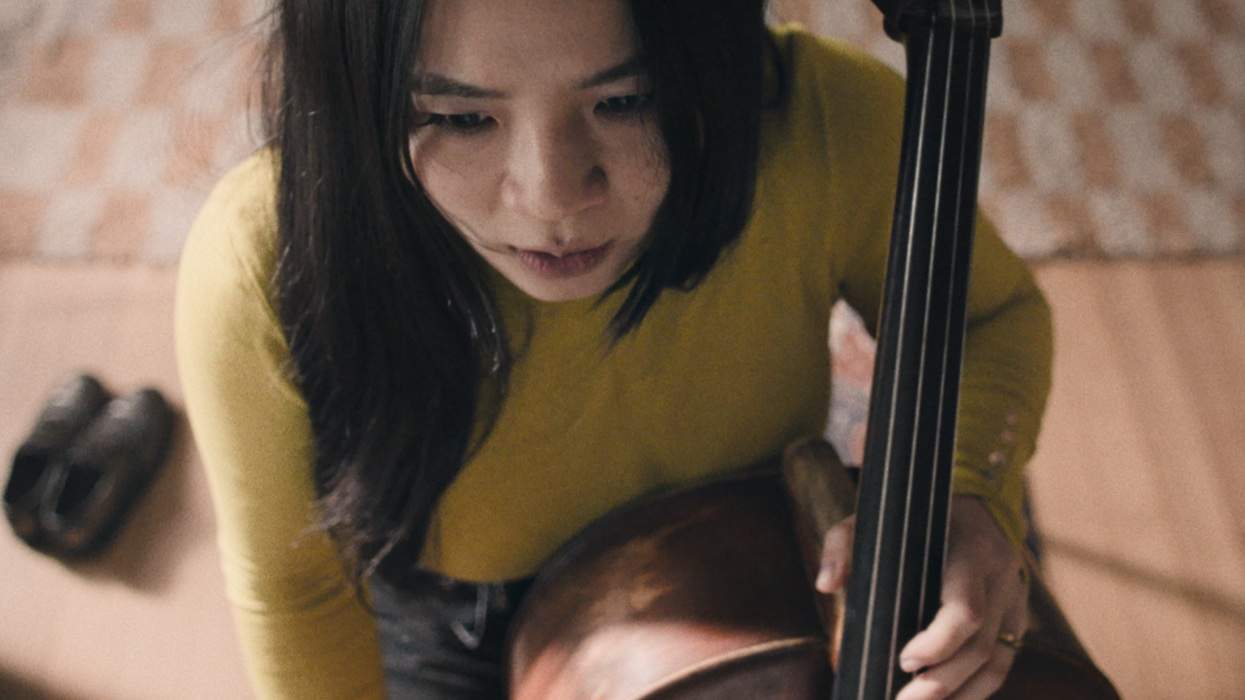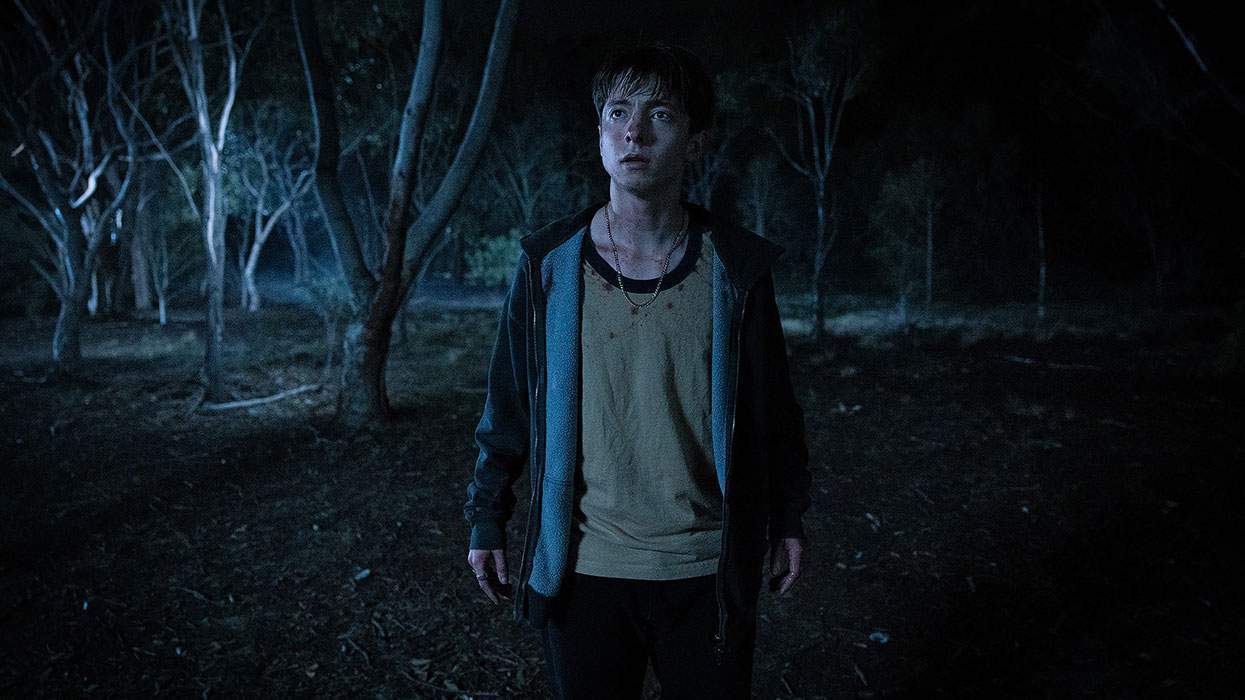"These are my coworkers," Keke Palmer's Mercedes announces to a big Wall Street fish she's got on the line as the ridiculously appealing women who round out her quorum saunter toward her in an upscale lounge in the new hit movie Hustlers. And while she is indeed enmeshed with the women in a loose business scam, they're so much more than coworkers. The women in the group, led by Jennifer Lopez's Ramona and including Constance Wu's Destiny, Lili Reinhart's Annabelle, and Mercedes, are sisters not only bound by the scheme they've cooked up to fleece Wall Street players out of their cash, but by their shared experience as women on the margins. As much as the movie -- inspired by Jessica Pressler's 2015 New York Magazine piece "The Hustlers at Scores" -- is the story of a specific class of women surviving amid the financial hardships spurred by the 2008 financial crash, it's also a queer-inclusive story about the love between women.
At the suggestion that Hustlers is ultimately a love story with Ramona and Destiny as the core couple, Palmer agrees, "Oh, yeah."
It does begin with Lopez's mama bear Ramona wrapping Wu's Destiny up in her fur coat as she doles out advice about life and making it as a dancer in a club frequented by dubious men of means, after all. And through highs, lows, and betrayals, Ramona and Destiny hold each other close at heart.
At 26, Palmer is an actress and singer who's starred in projects as far-flung as Akeelah and the Bee (2006), Joyful Noise (2012) with Queen Latifah and Dolly Parton, and Ryan Murphy's Scream Queens (2015). In 2015 she came out as part of the LGBTQ community as someone who said she wouldn't be defined by a single label.
"Everybody in the world -- you have your experiences and you feel your own version of trauma or just strife throughout life," Palmer, 26, tells The Advocate about the love story at Hustlers' center. "In this movie, you see women that are looking for that love, looking for that longing, that connection, that deep acknowledgment from someone, and they're able to create that with each other."
Keke Palmer as Mercedes
Hustlers, from breakout writer and director Lorene Scafaria, begins with Wu's Destiny, a young woman caring for her ailing grandmother and learning the ropes at a strip club. Rather, quite literally, she learns the pole in a scene where Ramona's pedagogical prowess around "ankle hooks," "knee hooks," and the "carousel" is on full display. Destiny has just begun working at the strip club frequented by Wall Street brokers circa 2007, and there's gobs of money to be made. The men in the film are customers, clients, objectifiers, a means to an end, and entirely beside the point. The women, including characters played by queer performers like Cardi B, Lizzo, Trace Lysette, and Palmer, become a support system for one another in a subculture that is largely void of men.
"You have the whole concept of Constance [Destiny] being left from her mom as a kid, and she kind of finds that nurturing that she was looking for in her relationship with Ramona -- and then they share that amongst all the girls," Palmer says of their female squad.
When the club scene dries up after the crash of 2008 and a lap dance doesn't buy what it did before Fannie Mae and Freddie Mac went belly up, the women try to make it at minimum-wage gigs. Even Ramona, with her penthouse apartment, furs, and Louboutins, resorts to folding tees at Old Navy for a pittance. But she's not cut out for that kind of life, and she soon concocts a plan to enlist her core group of girls to drug men looking for a good time and then scam them out of thousands with a single swipe of their trusty Amex Black Card. What Ramona, Destiny, Mercedes, and Annabelle get up to is flat-out criminal, but it's hard not to feel that the four -- primarily women of color -- are exacting deserved revenge on the white male patriarchy that pigeonholed them in the first place. And boy, do they make it look like fun -- until it's not.
"This whole country's a strip club," an unrepentant Ramona says at the close of the film. "You're either the ones throwing the money, or you're the ones dancing for it."
Despite the film's joyful moments between its characters, there are prescient sociological underpinnings of classism, racial disparity, and misogyny. Ramona remains justified even when her scheme eventually does real harm to some good guys and also places her crew of girls in various kinds of jeopardy.
"Like they say in the movie, 'Somebody's always dancing and someone's stolen the money.' That speaks to the world at large is that no matter how much money you think you have, no matter how little money you think you have, it's all a game in general," Palmer says. "The thing that everybody's after is money and financial freedom because they want to be free. In this world, that's all predicated on money. You can find yourself in the craziest of ways and doing the craziest of things, and you wouldn't even imagine that you'd be there."
Palmer and Lili Reinhart
Before their plan blows up in their faces, an early, revelatory scene in which the foursome celebrate their "business plan" with geysers of champagne and dancing invites the viewer to want to be a part of their world. Later a scene of the women and their extended friend group sharing Christmas gifts and stories of familial love further cement their bonds.
"That's why you feel that love from us [the characters] because it really is. We're all looking for our people," Palmer says. "We're all looking for a safe space. Even though the situation is nuts and it's criminal what they're doing, really what they want is a safe place and to feel like they have a protection that they've never had before."
A few of the scenes on-screen look like unfettered queer joy. In one scene Lizzo's character turns up in the dressing room of the club playing her signature flute while a dancer played by trans actress Lysette discusses dating while others share makeup tips. The camaraderie in those scenes worked so well in part because of the mutual admiration they shared off-screen.
"I loved all of them. I love Lili. I love working with Constance. She's such a class act. I love working with Jennifer. She was nothing but inspiring just throughout -- her being the producer, being the star, being the support for us, and being a consummate professional," Palmer says. "Everybody had grace."
Palmer also credits Scafaria with creating a vibe on set that carried over when the lights and cameras had stopped running.
"Lorene -- she's not only a visionary, she's humble and she's a true artist. She's almost like a little genius," Palmer says. "To work with her on her big first directorial debut, it [created] so many special moments for all of us."
Hustlers had barely finished screening at the Toronto International Film Festival last week before the critics and social media were abuzz with talk of an Oscar nomination for Lopez and praise for the diverse cast and Scafaria's vision in bringing to light stories of marginalized women.
"I hope [audiences] take away the concept of friendship and family and how important they are," Palmer says. "Also, I hope they take away that, shit, this is not just a movie about women having fun or [that they're] just strippers. This is a movie that has depth and that is also cinematically amazing. The visual representation of this film to me is also very slick."
Beyond the film's female solidarity, it's a movie with an inherent appeal to queer audiences. When asked how she feels about being a part of a project that resonates so deeply for people of various sexual and gender identities, Palmer couldn't be happier.
"It makes me thrilled, especially that they [queer audiences] feel close to it. I know so often you feel as if you're being put out -- it feels that the concept that we have is not being accepted in the mainstream," Palmer says. "Queer people are part of the world. So to not have them involved in things of the world, it seems odd. That's going out of your way because we're in everyday life."
Hustlers is in theaters now.


















Charlie Kirk DID say stoning gay people was the 'perfect law' — and these other heinous quotes
These are some of his worst comments about LGBTQ+ people made by Charlie Kirk.